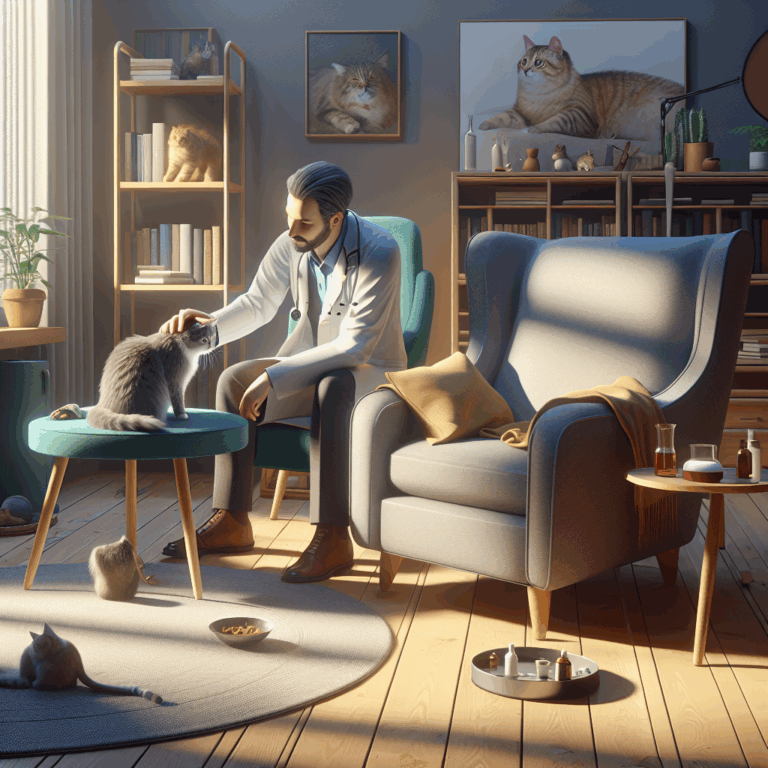The Feline Therapists: Cats and Their Role in Emotional Support
- No Comments
In recent years, the role of cats as emotional support animals has gained significant recognition, and for good reason. These enigmatic creatures, often lauded for their independent nature, are proving to be invaluable allies in the realm of mental health. While dogs have traditionally been the go-to for emotional support, cats are carving their own niche, providing comfort in quieter, subtler ways that resonate deeply with many individuals.
The soothing presence of a cat can be a balm for the soul. Their ability to sense human emotions and respond with gentle purrs or a warm snuggle is not just anecdotally but scientifically backed. Studies have shown that the frequency of a cat’s purr can have a calming effect, reducing stress and anxiety levels in humans. This vibrational therapy is thought to promote healing, lower blood pressure, and increase the production of serotonin, the body’s natural mood stabilizer.
Moreover, the companionship of a cat offers significant benefits for those suffering from loneliness and depression. Their presence provides a sense of purpose and routine, as caring for another living being necessitates daily engagement and responsibility. This caregiving aspect can be particularly beneficial for individuals who feel disconnected, allowing them to forge a bond that transcends words.
Cats, with their keen observational skills, are adept at picking up on their owner’s emotional states. They often choose to sit or lie close when they sense distress, offering a silent companionship that can be profoundly comforting. Unlike humans, cats do not judge or offer unsolicited advice, making them perfect confidants for those who need a safe space to process their thoughts and feelings.
The adaptability of cats also makes them excellent candidates for living environments that might not be suitable for other animals. Their small size and relatively low maintenance needs mean they can provide emotional support even in apartments or urban settings where dogs might not thrive. This accessibility allows a broader range of individuals to benefit from their companionship, including the elderly or those with mobility issues.
Organizations and therapists are increasingly recognizing the therapeutic potential of cats. Animal-assisted therapy programs now frequently include cats, using their presence to facilitate social interactions, improve mood, and even help in the recovery of trauma patients. The simple act of petting a cat can foster a sense of calm and mindfulness, drawing individuals away from their worries and into the present moment.
As the understanding of mental health evolves, so does the appreciation for the diverse ways in which animals can contribute to human well-being. Cats, with their unique blend of independence and companionship, offer a model of emotional support that is both ancient and innovative. They remind us that healing does not always come from words, but sometimes from the simple, silent presence of a loyal friend. As more people open their homes to these feline therapists, the profound impact they can have on emotional health continues to unveil itself, one purr at a time.

In recent years, the role of cats as emotional support animals has gained significant recognition, and for good reason. These enigmatic creatures, often lauded for their independent nature, are proving to be invaluable allies in the realm of mental health. While dogs have traditionally been the go-to for emotional support, cats are carving their own niche, providing comfort in quieter, subtler ways that resonate deeply with many individuals.
The soothing presence of a cat can be a balm for the soul. Their ability to sense human emotions and respond with gentle purrs or a warm snuggle is not just anecdotally but scientifically backed. Studies have shown that the frequency of a cat’s purr can have a calming effect, reducing stress and anxiety levels in humans. This vibrational therapy is thought to promote healing, lower blood pressure, and increase the production of serotonin, the body’s natural mood stabilizer.
Moreover, the companionship of a cat offers significant benefits for those suffering from loneliness and depression. Their presence provides a sense of purpose and routine, as caring for another living being necessitates daily engagement and responsibility. This caregiving aspect can be particularly beneficial for individuals who feel disconnected, allowing them to forge a bond that transcends words.
Cats, with their keen observational skills, are adept at picking up on their owner’s emotional states. They often choose to sit or lie close when they sense distress, offering a silent companionship that can be profoundly comforting. Unlike humans, cats do not judge or offer unsolicited advice, making them perfect confidants for those who need a safe space to process their thoughts and feelings.
The adaptability of cats also makes them excellent candidates for living environments that might not be suitable for other animals. Their small size and relatively low maintenance needs mean they can provide emotional support even in apartments or urban settings where dogs might not thrive. This accessibility allows a broader range of individuals to benefit from their companionship, including the elderly or those with mobility issues.
Organizations and therapists are increasingly recognizing the therapeutic potential of cats. Animal-assisted therapy programs now frequently include cats, using their presence to facilitate social interactions, improve mood, and even help in the recovery of trauma patients. The simple act of petting a cat can foster a sense of calm and mindfulness, drawing individuals away from their worries and into the present moment.
As the understanding of mental health evolves, so does the appreciation for the diverse ways in which animals can contribute to human well-being. Cats, with their unique blend of independence and companionship, offer a model of emotional support that is both ancient and innovative. They remind us that healing does not always come from words, but sometimes from the simple, silent presence of a loyal friend. As more people open their homes to these feline therapists, the profound impact they can have on emotional health continues to unveil itself, one purr at a time.


